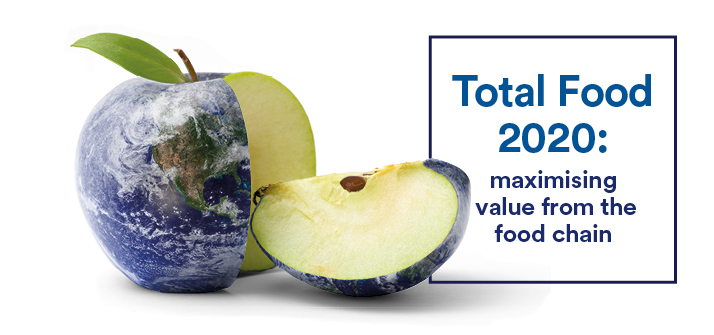
January 31, 2020, by Jo Gregory
Total Food 2020: addressing global challenges
Following on from our last blog which introduced the origins of the event and its evolution, Jo Gregory talks to Dr Eleanor Binner, Associate Professor in Chemical and Environmental Engineering and conference chair for Total Food 2020, about the theme for this year’s conference and the importance of getting maximum value from every part of the food chain.
Total Food 2020 is taking place at the East Midlands Conference Centre in Nottingham from the 14th-17th April 2020. The conference is sponsored by the Green Chemicals Beacon and the Future Food Beacon and will bring together industrialists, academics, policy-makers and charities with the common goal of protecting the environment and promoting human and animal health through waste minimisation and the optimal exploitation of co-products.
What are you hoping for in terms of outcomes?
The main motivation I have for continuing the Total Food conference series is to ensure that the community continues to have a forum to discuss the challenges in this area and share developments. We also want the community to continue to grow, as it has since the first conference in 2004, and have a voice when it comes to policy and funding. Together we are undertaking a lot of collaborative research and development that’s really having an impact in this field. We want to share these stories and make sure that food waste stays squarely on the political and social agenda.

The theme of this year’s conference is around maximising value from the food chain. What does this mean and why is it important?
We are no longer talking about reducing waste, we are talking about getting the maximum possible value from every part of the food chain. This includes being more efficient and sustainable with how we grow, harvest, store, transport and use food products, exploring new, more sustainable sources of protein, and making sure that no food intended for human or animal consumption is wasted. But it is broader than that. What can we do with the products of the food industry that can’t be eaten? The community is developing new materials to replace plastics and new chemicals to replace petrochemicals. And these new products could help to address global challenges such as hunger and plastic pollution.
Do you feel there is a benefit to holding this year’s conference at Nottingham? And if so why?
Absolutely! Nottingham’s a great place for research and teaching across the whole food chain. The fact that the University has funded both the Green Chemicals and Future Food Beacons of Excellence who are sponsoring the event is testament to the fact that we are working to address the global challenges that are at the heart of the conference. We have also recently launched a Food Engineering MSc programme in recognition of the fact that to have a sustainable food industry we need to invest in skills in this sector. And finally, Nottingham scientists did after all save the original Bramley Apple tree and ensure its survival by cloning it, and it seems appropriate that the conference venue is located at the site of the cloned Bramley Apple Orchard.
The registration deadline is 22 March. Programme details and booking available here.
Discounted rates for students and SMEs are also available.

Many components are been made to enhance the life of foods and save them from bacteria but still most of the death occurs because of the lack of food.